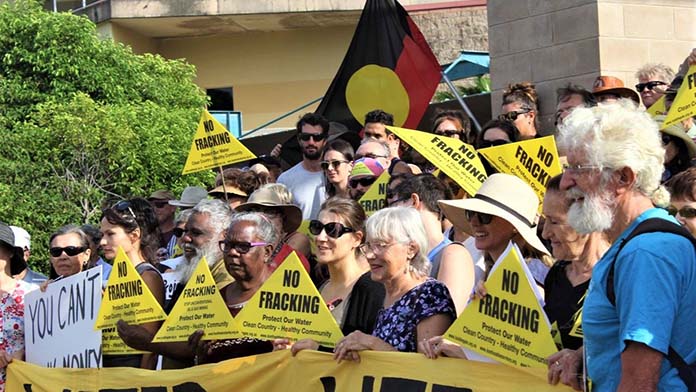One year since their election Labor’s claim they would “end the climate wars” has been exposed as cover for supporting fossil fuel expansion at an alarming rate.
On 3 May, the Northern Territory Labor government announced that they would open up the Beetaloo Basin for fracking. The next week, Environment Minister Tanya Plibersek gave the go ahead to four new coal mines. These announcements arrived just as scientists warned that the world is likely to exceed 1.5 degrees of warming within five years.
They were also one month after Labor’s revamped Safeguard Mechanism was passed with the support of The Greens, amid claims that gas projects in the Beetaloo had been “derailed”. Nick Feik, former editor of The Monthly, tweeted “Congratulations on everyone who pushed for Labor’s safeguard mechanism. It’s working exactly as intended.”
Beetaloo
The federal government’s Department of Industry, Science, and Resources considers the Beetaloo Basin to be a “world-class gas province” that could “rival the world’s biggest and best” gas fields. The plan to open up this enormous gas basin would be a climate disaster, releasing up to 1.4 billion tonnes of greenhouse gas over its lifetime—or 2.5 times Australia’s current annual emissions.
In giving the green light to fracking in the Beetaloo, NT Chief Minister Natasha Fyles claimed that all the 135 recommendations of an independent inquiry had been met.
This is simply a lie. The NT and federal governments have failed to act on the key recommendation “to ensure that there is no net increase in the life cycle GHG emissions emitted in Australia from any onshore shale gas produced in the NT.” The only plan to address emissions so far is through dubious offsets to the emissions released during mining as required under the Safeguard Mechanism.
Independent Oversight Commissioner to the NT Fracking inquiry, Dr David Ritchie, confirmed in a letter to the government that “there has been no progress on the crux of the recommendation.”
There is nothing in place to address domestic emissions when the gas is burned for its end use. Climate Change Minister Chris Bowen admitted to ABC Radio Darwin that “there was some work to go yet” and stated that the Energy and Climate Ministers Council would discuss the issue later this year.
Federal Labor MP Marion Scrymgour has broken ranks to call for a halt on mining approvals in the Beetaloo, pointing to widespread opposition. She also noted that a requirement to consider the impacts of fracking on water use has still not been written into federal legislation as promised.
Traditional Owners also condemned the Beetaloo announcement. Fyles has claimed that Indigenous land owners in the NT have the power to veto projects—but once they consent to initial exploration they cannot stop any development, no matter how great its impact.
Traditional Owner for the area Johnny Wilson explained that gas companies have failed to provide clear information: “No one we speak with has ever understood, or now understands, the scale of what is coming.” And this only applies to land under the Land Rights Act, not Native Title.
While companies will still have to apply for production licenses to proceed with fracking, state and federal Labor have made their support clear. In the 2022 budget, the Albanese government committed $1.5 billion of public money to the Middle Arm precinct in Darwin.
While Labor claims that Middle Arm will be a “sustainable development precinct”, government documents sent to Plibersek in July and recently released under freedom of information confirm that “Middle Arm precinct is seen as a key enabler for Beetaloo gas to be transported north”.
Coal approvals
Plibersek also used the cover of budget week to approve Labor’s first coal mine since coming to power, the Isaac River mine in central Queensland. She also refused to reconsider approvals for three more mines on the grounds of climate impacts—the Mount Pleasant Coal Mine in the Upper Hunter, the Ensham Coal Mine in Queensland’s Bowen Basin, and Whitehaven’s Narrabri mine.
Of these, Whitehaven’s mine is the most dangerous due to its high volumes of methane; set to release 18 million tonnes of CO2 equivalent before any coal is burned. Plibersek is also yet to decide on another 11 projects.
In the same week the new NSW Labor government approved three more coal projects—Mount Owen, Liddell Coal and Ravensworth Coal, all extensions of existing Glencore operations.
Both the International Energy Agency and the Intergovernmental Panel on Climate Change have warned that new coal and gas projects must stop if the world is to have any chance of avoiding climate catastrophe. The climate movement still has a big fight on its hands to stop Labor’s coal and gas expansion.
By Angus Dermody






